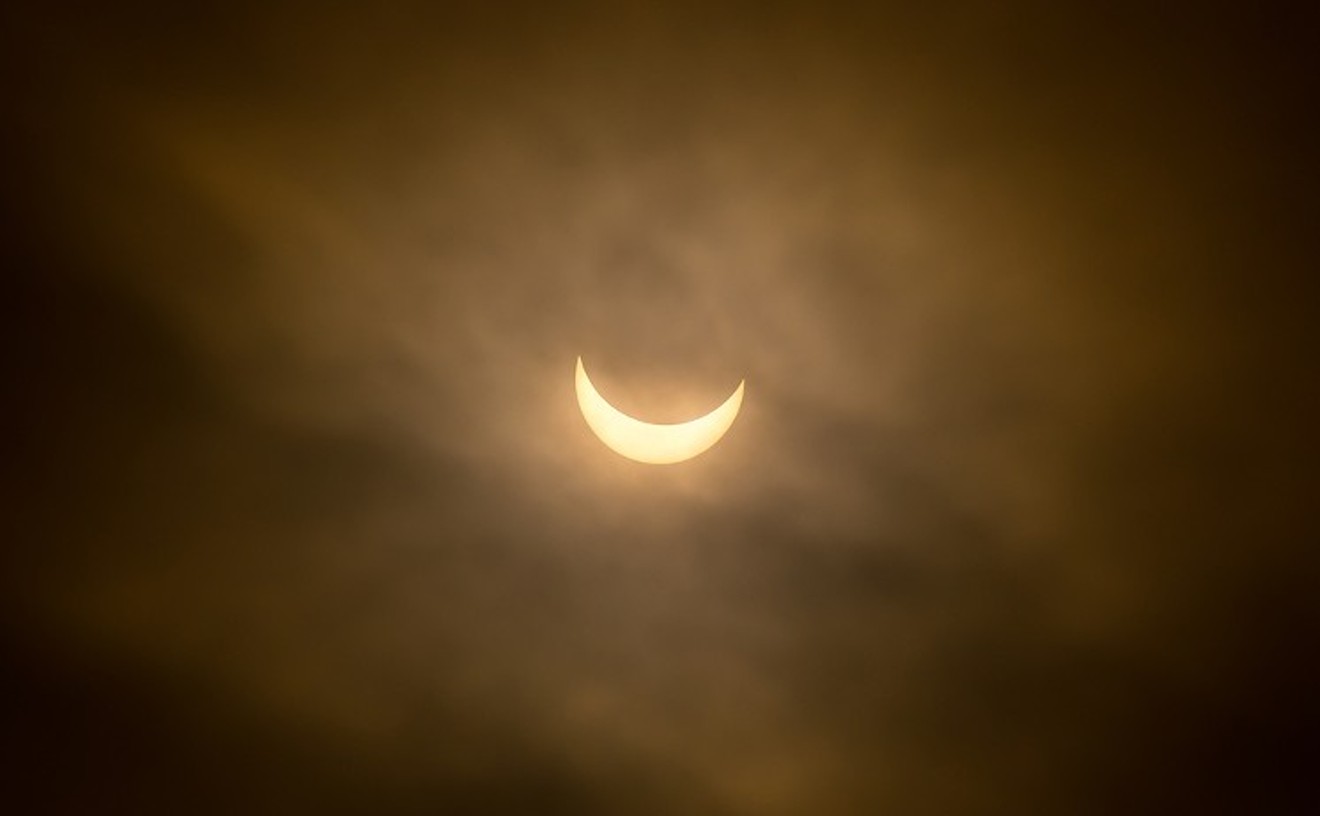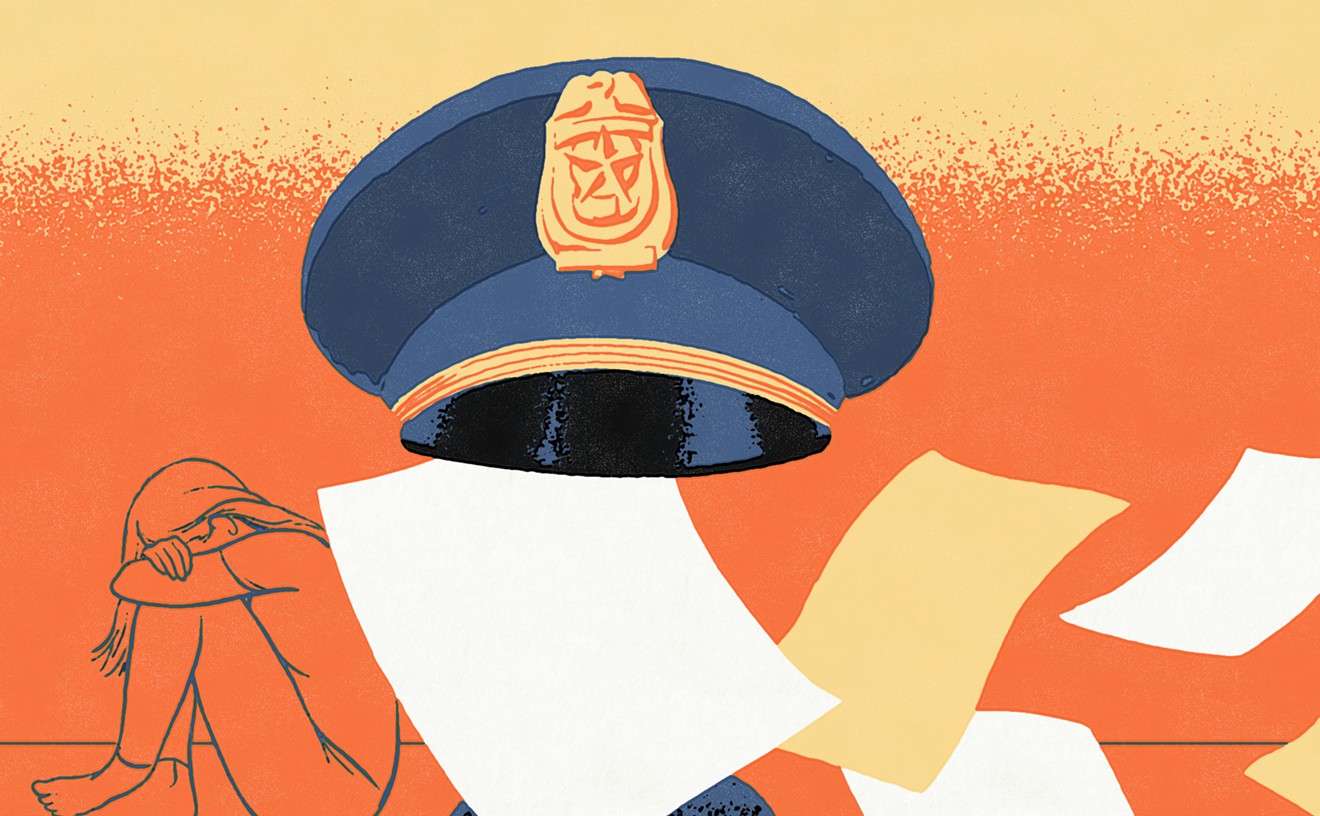It's late in the morning, New Year's Eve, and most of Dallas is still reeling from another of the Cowboys' trademark December meltdowns, their team sent home early yet another year. For the city's vast army of professional sports yappers, Christmas has come again.
Inside the Central Expressway studios of KRLD-FM 105.3 The Fan, members of the G-Bag Nation, the station's midday show, compare DeMarcus Ware to a rabid, pre-gunshot Old Yeller and debate whether Jason Garret, the Cowboys' perfectly mediocre head coach, should return in 2014. The show's newest member, a 36-year-old former Major League pitcher named Mike Bacsik, waits quietly, patiently, but not necessarily calmly. With his lengthy left arm resting atop his open laptop, and the rest of his 6-foot-2 frame perched upright in his chair, he's ready to pounce, aching to chime in.
Finally, Jeff Cavanaugh, one of the hosts, swings his chair toward Bacsik, motioning for him to speak up. Off Bacsik goes, uncoiling like the pitcher he once was: "The problems with this organization go so far beyond who the head coach is at any point and it just makes me mad."
You get the sense it's no manufactured sports take, that Bacsik is genuinely distraught. Though a pitcher by trade, his is a lifelong love affair with multiple sports, which accounts for a substantial dose of the adrenaline. But he's also just excited to be in a studio, working and talking, which seemed impossible not long ago, after a series of drunken, idiotic tweets that he punctuated with some casual racism. He was back in radio, improbably, after being left for dead in the second career he loved only a few years after he famously flamed out of the first.
It was in his gloomy motel room at the Kirk's Motor Court in Burlington, North Carolina, its air thick with the scent of low-rent rooms and its carpet stained with who knows what, that Bacsik finally broke down and cried.
It was 1996. He was 19 and had been drafted by the Cleveland Indians in the 18th round. He'd starred in baseball and basketball at Duncanville High and turned down a full ride to play baseball for Texas Tech, the school where Sue — then his girlfriend, now his wife — was already enrolled. He was making $825 a month pitching for the then Burlington Indians — officially a professional ballplayer, but $250 went to the "roach motel" room he shared with a roommate, a fellow pitcher who would play seven seasons without making the bigs. Using prepaid calling cards, Bacsik called home three times per week, but that did little to curb the homesickness he felt for his two and a half months in Burlington.
Sue, now a pediatrician, was supportive, even if her "plans for us were crushed," she says. "He was in Burlington, but it might as well have been Australia, since it was before email and cell phones. That's when I learned my first grown-up baseball lesson — don't make plans."
Bacsik, though, was losing faith. What did I do? he thought to himself that night in his room. I've got a girlfriend going to the same college I could've gone to. Through the tears, he wondered if he was letting a far-from-guaranteed fantasy of baseball stardom get in the way of a very real life and love that anyone would envy.
"I went through high school and summer ball, and I was the best player," Bacsik recalls, sitting in a cluttered conference room near his broadcast booth. "Very rarely did I get on a field where there were better players than me. I remember thinking, right after I was drafted, 'I'll play in the minors for two or three years, then get to the majors and pitch until I'm 40, retire, and it will all be awesome.'"
Bacsik impressed his coaches during his earliest days in the minors, but his stat sheet was never enough to make the phone ring. By 2001, his sixth season toiling in rickety buses and sweltering locker rooms, he wondered if it ever would.
"Some of my friends were getting that call," Bacsik recalls. "I was really mad one night about not getting promoted and I prayed. I said, 'God, if it's not your will for me to play in the big leagues anytime soon, I want to accept that. I want to thank you for the chance to just play baseball for a living.' The next day, Eric Wedge, who was my Triple-A manager, called me and he said, 'Mike, I just got the call, you're going up to the big leagues.' I know that may sound like a load of malarkey to some, I mean, I wasn't homeless and it was just sports, but God was there for me then."
Bacsik was there. Now he had to stay there. A new emotional tug-of-war presented itself, with Bacsik getting called up into a comfortable life in the high-dollar, five-star world of the MLB, only to be sent down. The pulling of Bermuda grass from under Bacsik's cleats would happen more than he could've imagined.
"Being sent to the minors was like graduating high school after making all of the grades you needed to make," he says, the pain still resonant. "I'd been handed my diploma and a few weeks later, it was as if the school decided to take the diploma back. Getting sent down to the minors is like getting called into the boss' office to be fired, and I got called into the boss' office a lot."
Between 2001 and the end of 2008, he never played an entire season in the majors. He pitched briefly for his hometown Rangers in 2004, giving up eight runs in 15 innings. He made his biggest contributions in 2007, pitching in 29 games for the Washington Nationals, going 5-8 with a 5.11 ERA. It was just long enough to pitch his way into infamy.
That summer, Barry Bonds, the asterisk-toting slugger for the San Francisco Giants, was nearing the record for career home runs, set by Hank Aaron in 1976. On August 7, Bacsik faced the hulking Bonds, proffering a not-that-fastball over the meat of the plate that Bonds powerfully deposited into the right-field stands of San Francisco's AT&T Park. There it went: 756.
To make his odd spot in baseball lore more awkward, two years later a former teammate, Tim Redding, publicly alleged that Bacsik had purposely grooved the pitch, helping make history and perhaps earning a few bucks. Sue was hours from welcoming their third child as calls poured in from the media. Then, as he did the night Bonds broke the record, Bacsik handled the media with honesty, humor and a spirit of self-deprecation, endearing himself to viewers and reporters alike. Predictably, and believably, he denied purposefully serving Bonds up. Still, the pitch remains a bleak milestone.
"There was always a circus around Bonds because of the steroid controversy," Bacsik says. "After 2007, Major League clubs viewed me as a part of that circus and they wouldn't take a chance on me. Giving up that home run may have actually ended my career."
A few years before, on a June afternoon in 2003, Bacsik and his new team, the New York Mets, were in Arlington for inter-league play. Baseball wasn't on Bacsik's mind as much as talking about the NBA, and especially his beloved Mavericks, was. In a crowded locker room, Bacsik went looking for, and found, Dan McDowell, the co-host of the popular KTCK-AM 1310 The Ticket midday show, BaD Radio.
"Bacsik came over to me and introduced himself, which was weird," recalls McDowell, who counts Bacsik as a friend. "It was funny, because he kind of cornered me to talk about the Mavs, and I kind of casually looked for a way out of there, which is totally the opposite of the normal scenario in a locker room."
Bacsik, who would never land a massive payday, had long been thinking about what to do when he retired. In each of his first three off-seasons he'd managed to rack up a few dozen college hours. And he had always been fascinated by the media. Growing up, his family had season tickets to Mavericks and Cowboys games, and with help from his dad, a former Rangers pitcher named Mike Bacsik Sr., Junior began to appreciate the media's role in telling a game's story. He and his dad discussed games as if they were color analysts, and Dad used the scores to teach his son math.
Two years after he tracked down McDowell, in 2005, Bacsik was nearing rock bottom of his baseball career, failing to play in the majors for the first time in four years. He called McDowell and asked for an internship. McDowell made it happen, and after that season, he says, "I basically went up to the station every day, Monday through Friday, until I started training for the 2006 season."
He spent most of the internship searching for audio clips for BaD Radio's weekly "Homer Call of the Week" segment, among other chores. Every third day he had to go on a burrito run for the crew, which he didn't mind because it meant a burrito for him, too. He did it all gamely, save for the tedious transcription of segments for marketing purposes, which he says he managed to bargain his way out of with other interns. Meanwhile, he focused on trying to get on the air.
"I would occasionally have some good opinions on things that Dan, Bob Sturm and I would be discussing," Bacsik says. "That's when I got used to having a microphone in my face and really loving it. I went back to playing baseball in 2006, but I knew that I had my foot in the door of radio in the city I wanted to live in the rest of my life."
With baseball getting in the way, a shot at real air time didn't come quickly. But in 2008, while he toiled again in the Nationals' system, he decided he'd had enough. He retired, and soon after he received the call that represented his chance to transition from being the topic of sports talk to conducting it.
Some changes had taken place on the The Ticket's weekend schedule, and Mark Friedman, the producer for Norm Hitzges' show, suggested his bosses consider Bacsik. Soon Bacsik found himself co-hosting a weekend show with Kevin Scott. And when Friedman left for KESN-FM 103.3 ESPN, and Scott defected to 105.3 The Fan, Bacsik, the radio rookie, was faced with an appealing decision. The call, for once, was his to make.
The Ticket wanted him to replace Friedman as Hitzges' producer. The Fan wanted him continue co-hosting with Scott. While an on-air job was his ultimate goal, Bacsik had done enough bouncing around in his baseball days. He was ready to build a high-wattage home.
That spring, just weeks after he joined Hitzges' show, they flew to Florida to cover Rangers spring training. Even with a plum new job, "I'd get near the field and see a lot of my buddies and they'd ask me what I was doing and why I wasn't pitching still," Bacsik says. "It was like torture for me, but when we got back to Dallas, I knew I had made the right choice."
The feeling was mutual. The Ticket's veteran talent was impressed by the lack of coddling Bacsik required and the zeal with which he approached his new post. "Nobody was more excited to come to work each day," remembers Craig Miller, who co-hosts the station's award-winning morning show.
Adds Hitzges: "I needed to get the best person out there. Mike is a high-energy guy with a terrific work ethic and he really loves sports. In this world, you have to learn how to adjust and Mike knew how to do that and made it look easy."
Bob Sturm, McDowell's BaD Radio co-host, was struck by Bacsik's pure fandom. "Mavericks playoff games would sometimes hit on his work days during his baseball career and distract him," Sturm says, like in 2006, when the Mavericks were hoping to knock out the San Antonio Spurs in the Western Conference semifinals. Manager Chip Hale could sense that Bacsik was distracted, and mercifully allowed him to watch the game from the clubhouse. Some teammates even joined him.
And like all of The Ticket's producers, Bacsik found his niche on the air, co-hosting the station's Rangers post-game show. He had become an established member of an esteemed group. Like his baseball career, it'd been a long slog, from fetching burritos to manning one of the most powerful microphones of big-market radio. Unlike baseball, though, his death would come quickly, at the fumbling hands of too many beers and one terrible tweet.
It happened on a Sunday in 2010. Bacsik's beloved Mavs were in an opening-round dogfight with the Spurs, and a friend from out of town joined Bacsik to watch game four at the McKinney Avenue Tavern. Bacsik doesn't drink much, he says, about five beers a month, but that night he went unusually hard. As the game's second half progressed, the calls weren't going the Mavs' way, and Bacsik was growing irrational and angry.
Then he started tweeting. He says he was trying to utilize a bit of his employer's trademark "Ticket Shtick," which often tightrope walks the lines of decency. But Bacsik, drunk, tumbled off the rope.
"12 deep and some shots, so f this league," he tweeted.
"If I get cancer and I'm going to die I will blow NBA offices," he went on.
"I wonder how big Sterns cornhole is."
Then came the tweet he would find himself deleting and apologizing for and meeting about, 49 irredeemable characters screen-grabbed by every quick-fingered sports blogger in America: "Congrats to all the dirty mexicans in San Antonio."
The next day, Bacsik was suspended by Cumulus Media Inc, parent company of The Ticket. The day after that, he was fired. His tweet had attracted coverage from the Huffington Post, CNN and Deadspin, which called him a "Dumb Honky." He tried to save face, calling into San Antonio's KTKR-AM Ticket 760. Spurs great Bruce Bowen refused to accept Bacsik's apology and called Bacsik a racist. AOL Jobs.com ranked Bacsik's "Tweet Thwarted" career just three spots behind that of disgraced New York Congressman Anthony Weiner. Bacsik was immediately and deeply apologetic, the only route available to him. But it was no use.
"I've never blamed anyone else for the tweet," he says. "I got calls from other stations wanting me to blame The Ticket, but that wasn't an option because it was my fault, not The Ticket's. I own it and I think about it every day. It's made me a better person because I really think about what I say before I say it now.
"It's hard to understand how it felt," he goes on, "unless you've done something that incredibly stupid."
Bacsik went home, forced again to ponder which road to travel next. His Ticket pals called to comfort him, but the weeks after his firing were "devastating," Sue says. Bacsik didn't eat or sleep, losing 10 pounds that first week. The few times he clicked on the TV or surfed the web, he was inevitably greeted with a story about his own stupidity. "The week or two after Mike was let go from The Ticket were probably the hardest of my grown-up life and of our marriage," she says.
"I was certain my career was destroyed," Bacsik says. "I remember meeting with [Dallas Morning News sports media columnist] Barry Horn around that time, and he told me he didn't think I would work in media again."
He retreated back to college, finally earning his degree in university studies from University of Texas-Arlington. And, he says, he leaned on the same God he prayed to in his minor league days. "I was ashamed after being fired," he says. "I needed my family and God. And my church really supported me, too. Without that support, I would've been on my own."
For a moment, it seemed like the answers might be back on the mound. A year after his tweet, Bacsik was trying to keep busy, coaching kids and pouring his energy into staying in shape. Then came another call: His father had become the pitching coach for the Fort Worth Cats, a minor league team in the independent United League Baseball. The younger Bacsik joined him on the team to see if any magic remained.
He was 33. It was Memorial Day. The crowd was sparse as Bacsik and his teammates, a roster mostly composed of former junior college and college players, took the field. Bacsik believed he would only pitch three innings, but he was left in for five instead, and immediately afterward he experienced burning in his left shoulder and elbow. Though he went on to pitch for a majority of that season, he wouldn't make it to the end, as his left arm finally gave in against the Grand Prairie Air Hogs.
"When it ended with the Cats," Mike Sr. says, "I knew his baseball career was over. His elbow couldn't take the stress of being a professional athlete."
"That experience really shut down the feelings I had during that first spring training away from the game," the younger Bacsik says. "I was finally done as a baseball player in my brain as much as I was in my body. It was actually good to have closure."
Bacsik went back to work, juggling jobs in and around baseball. The sports world forgives easily (see ex. Cooper, Riley), and the lily-white sports-media world does too, so Bacsik was soon allowed to dip a toe back into broadcasting, doing color for Fox Sports' coverage of TCU baseball. He taught at D-Bat Academy in Allen, coached the Highland Park Scots 13-year-old team and gave private lessons. Only during his time coaching and teaching lessons did "The Tweet" occasionally come up, usually from curious students.
It was during that time that Bacsik received a call from someone even more notorious than him: former Ticket star Greg Williams. "Greggo," as he's known to listeners, has had a tumultuous career in Dallas radio, battling substance abuse problems and being fired, he says, from The Ticket himself. (The station says he quit.) Williams called Bacsik and promised to mention his name to Bruce Gilbert, his boss at The Fan, where Williams was hosting afternoon drive. (He's since been fired from that station.)
"I really had to talk Bruce Gilbert into calling him because of the Twitter thing, but I knew how hard he had worked as an intern," Williams says from his Gainesville home. "And that was impressive because he wanted to work for it, and not have it handed to him. I don't think he should've been fired from The Ticket, so I was thrilled to help him because he is a truly good person."
Bacsik waited for the call. When it finally came in September 2011, there wasn't an immediate opening to be filled. But as they spoke, Gilbert was won over by the same energy and honesty that Hitzges, Sturm and Williams admired. From then on, the decreasingly present 49-character elephant in the studio wasn't an issue. He'd been absolved, if not by the wider public then at least by the local media power structure, for which ratings trump decorum anyway.
During the conversation with Gilbert, Bacsik uncovered The Fan had not planned any postgame coverage for the Rangers' 2011 playoff games. He pitched them a show, and for $50 a night Bacsik was back on the air, talking about baseball. Before long he was on the air talking about all sports. Eventually he found his way into the G-Bag Nation.
Bacsik knows that not all radio gigs are created equal — that the facetiously self-dubbed "Little Ticket" towers over the two other local sports signals, and that The Fan can only hope for a distant second place. For CBS Radio, which owns The Fan, it made sense to take a risk on someone who'd been popular on The Ticket's airwaves.
Listeners remain curious about The Tweet. A few months back, the G-Bag Nation did a full segment on it, with Bacsik providing a replay of his firing. But his coworkers have made little mention of it, he says.
"He loves radio and respects the craft," says Gavin Dawson, the G in G-Bag. "A lot of former pros don't want to have a strong opinion out of fear of being kicked out of the club, or they can't be entertaining outside of breaking down the mechanics of a game. Mike comes out swinging."
As New Year's Eve rolls on, the autopsy of the 2013 Cowboys is set aside, and the crew, fresh off a commercial break, draws up plans for a basketball roster made up of the show's on-air talent. It's for a theoretical contest against the lowly Champion Baptist College men's basketball team, which had suffered a 104-point defeat the night before. (Bacsik, the tallest, would play the post.) They're flowing now, chummy and casual as they decide they "could take" the slaughtered lambs of Champion Baptist. Which they probably couldn't, but who cares? They're doing radio.
"I've got big dreams now," Bacsik says after the show. "Ten years from now, I want to be a part of something special here at The Fan. ... I'm not stupid, I know what we're up against with The Ticket, but I'm committed to this.
"It's going to take time, but I love the group of guys I'm with now, and I think we can make this into something really special."











